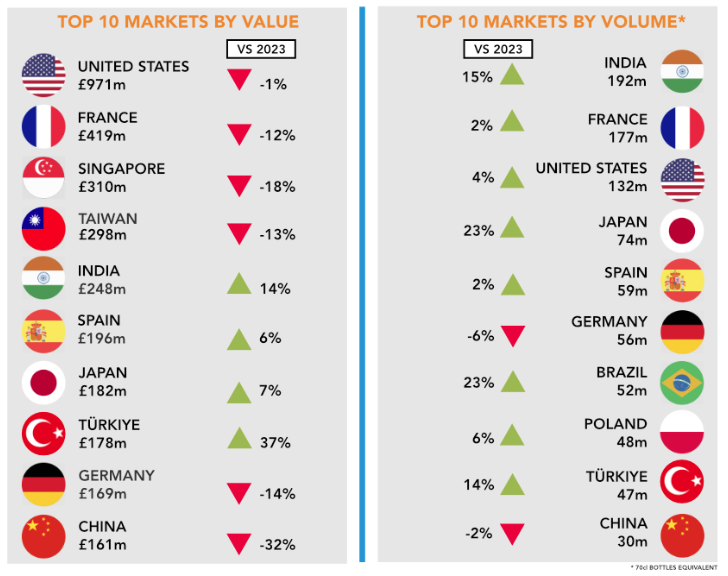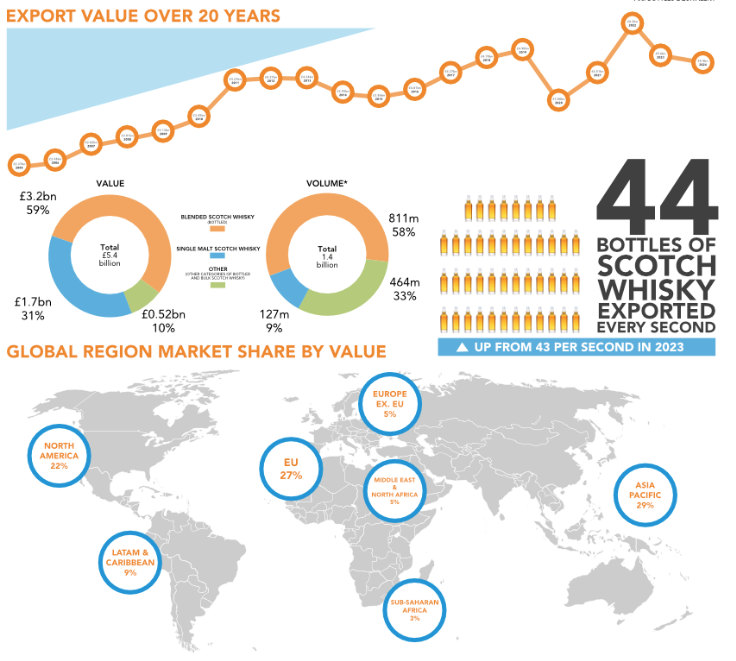Scotch Whisky Export Figures 2024
Find out the latest Scotch whisky export figures released by the Scotch Whisky Association (SWA).
Cask Trade
Table of contents
- Market Overview
- Whisky Fans Discovering New Distilleries
- What Whisky Trends to Look Out for in 2025
- Scotch Whisky in the United States
- Case Study: Türkiye
- Conclusion
The latest Scotch Whisky Association figures released for 2024 show a 3.7% decline in total export value on 2023. It’s a figure that is still up 10% on pre-Covid pandemic figures, which supports the observations Beyond The Cask made in October: Scotch whisky is down, but most definitely not out.
They point to a future for Scotch whisky that is more tied to the individual economic performances of the countries that it exports to than previously thought. This is shifting what distilleries are popular and where, but also how people discover new brands and flavours.
Crucially the results show that the industry has the resources to drive success in countries such as Türkiye, where alcohol is only drank by a minority of the population. Learning from winning in markets such as this, can shape and motivate an approach to the potential in those like the United States.

Whisky Fans Discovering New Distilleries
Evidence that the macro-economic situation is affecting whisky value (typically driven by high-end, older age statement bottles of Macallan and Bowmore) can be seen in the top ten market comparisons. China, where these high value driving whiskies have typically performed well, saw its Scotch whisky import value reduce by 31.5% on 2023, although this is still up 81.4% on 2019. This has come whilst China is in the midst of its own economic struggles, including a collapsed property market and business wide salary cuts. As NBC news reported last year, this is fuelling a trend called “reverse consumption,” where consumers focus on price and value rather than brand names. Cask Trade’s account manager in Hong Kong, John Wong, has observed that whisky fans are discovering their favourite flavours in previously lesser known distilleries such as Ardmore, Bunnahabhain, and Ledaig.
This is a trend that has been mirrored in UK whisky drinkers, with supermarket deals and auction finds taking precedence over brand loyalty. Mark Kent, Chief Executive of the SWA said: “At home, distillers are being stretched to breaking point, as consumers bear the brunt of a 14% increase on the tax on every bottle of Scotch Whisky in the last 18 months alone. The cumulative effect of inflationary impacts on input costs such as cereals, energy and shipping, and the increased tax and regulatory costs, including the substantial cost of EPR coming later this year, are being fed through to consumers when they are tightening their belts.”
Then there are those who are performing well; India, which is currently experiencing stable growth with an increasing middle class, saw a value increase of 13.8% on Scotch whisky imports on 2023, up 49.5% on 2019. It also regained its position as the largest volume market over France, with brands such as The Glenlivet continuing to grow. Spain, which the Economist magazine recently ranked as the world’s best performing economy, saw Scotch import values increase 6.4% on 2023, up 8.8% on 2019. It is benefitting from a more balanced long term sustainable economic model, with less reliance on industrial industries, and a tourism industry that is taking over France as the number one destination in the world.
What Whisky Trends to Look Out for in 2025
Looking for trends and flavour preferences in the countries that are performing well is a place to start, also look out for popular whisky bars opening and online communities growing to find out what their influencers and whisky advocates are saying. In contrast, keep an eye out for those brands which are gaining new favour thanks to their quality and price point in struggling economies.
Scotch Whisky in the United States
The United States is in a more nuanced position. It is still the number one value market for Scotch whisky at £971m, but the effects of 25% tariffs imposed by the last Trump administration between October 2019 and March 2021 saw Scotch whisky imports down 9.1% value on 2019. This figure was down 0.7% on 2023, with volume up 3.7% - indicating a move in the right direction – however the Scotch whisky industry will be keen to avoid further tariffs in 2026. There is also the domestic bourbon market offering a challenge; it has seen a boom in recent years, with consumers supporting local producers and new ventures. Combine this with a route to market that doesn’t see many top line single malts, and the US is still somewhat of a hurdle for Scotch whisky. A mature drinking market that leads in value, but is still untapped in terms of its full potential.
Sky News reported last week that the lack of trade deficit with the US puts the UK in a favourable position to the EU when negotiating tariffs. Regardless of this, if the UK is successful in avoiding tariffs on Scotch whisky exports to the United States, the whisky industry will have to be ready with a strong game plan to ensure they make the most of it.
To achieve success in the United States, Scotch whisky may have to look to the practice of growth in developing markets, such as India, Poland, and Türkiye, where bread and butter advocacy and investing in local brand activations have made the most of favourable economic conditions.

Türkiye Case Study
Why is Scotch Whisky is winning in a country where 90% of people don’t drink alcohol?
We spoke to Keeper of The Quaich – Burkay Adalig – who after becoming the first whisky blogger in Türkiye, found himself as one of the key driving forces behind whisky’s growth in the country. It’s a journey that has seen him write four books on the subject, introduce hundreds of new whiskies to the market through his blogs, become the only Turkish person in the world able to recite address to a haggis, and - most interestingly for us here at Cask Trade – launch the first independent whisky in Türkiye, Project W.
Last week he attended the prestigious Keepers of the Quaich (those nominated for their contributions to Scotch whisky), ball at the Pera Palace Hotel – the original residence for passengers of the Orient Express in Istanbul. He was one of fifteen Keepers from Türkiye, testament to their countries support of the industry. The country's growth is a story of the last decade, Burkay points to four key factors; Social Media, Duty Regime, Brand Advocacy, and winning in premiumisation.
Türkiye’s population is 83 million and around 57 million those are on Instagram, this has helped circumnavigate the country’s strict alcohol promotion regulations through organic growth. Whisky fans and influencers have taken Scotch whisky into the 21st century, shedding the old man perceptions and turning it into a drink that young aspirational professionals want to enjoy. In this sense whisky isn’t trying to make itself relevant, it happened organically, and this is a huge part of its strength in the country. The popularity among aspirational professionals is also an economic decision. With duty on all alcohol sitting at around 70%, drinkers are opting to buy a bottle of whisky instead of beer and wine – which are increasingly seen as not worth the price on account of their strength and quality. As well as blends such as Chivas Regal and Ballantine’s, the Singleton of Dufftown 12-Year-Old is the biggest selling single malt in the country thanks to its strong age statement and price point. This is making it the drink of choice for nightclubs and parties, a key place to win if whisky is to attract younger fans.
The shift to whisky is also impacting and influencing the local spirit – Raki. 39m litres were sold last year vs 34m litres of Scotch whisky, a figure that was unthinkable ten years ago. Producers are also creating oak cask matured Raki and smoky variants, with packaging becoming more premium thanks to the influence of Scotch. Turkish consumers are ready for this premiumisation and much like we saw in the early stages of whisky growth in developed markets, premium blends such as Johnnie Walker Blue Label and Chivas 18 are incredibly popular. There are also signs that single malt is following suite, when Burkay released his first Project W single cask independent bottles of Glenturret and Mannochmore at £400 per bottle, they sold out in a couple of hours.
Investment in Whisky Advocacy
Most of the above reasons are macro circumstances, they would have occurred regardless of Scotch whiskies involvement or not. Investment in local activations and brand advocacy from the likes of Pernod Ricard and Diageo has ensured that it has not been an opportunity missed. Burkay was the first of what are now many whisky bloggers and ambassadors in the country, who work with drinks companies to share information about their brands. He says there were around 50 different whiskies in the Turkish market in 2012, now there are over 400 thanks to distributors stocking brands that Burkay has written about over the years. He describes a recent tasting where Glenlivet infused steaks with their single malt and cooked them using the heat from a live glass blowing, something that got people talking and took their whisky experience to the next level.
Conclusion
Much has been reported on the difficult year for the drinks industry, with the unavoidable trend of people drinking less across every age category. Health and wellbeing is playing its part, but wider economic factors and the cost of drinking is often understated. In the UK people have less active income across the board and are looking to savings and investments for long term stability. On an average Gen Z graduate salary of £25k a year, a pint in London would cost you around 45% of your hourly wage.
But the SWA figures remind us that Scotch whisky’s long term growth remains moderate and intact, with strength found in quality and provenance. Learning from past mistakes and looking to what is happening in new opportunity markets is the way forward.
Read Cask Trade's marketplace report
If you would like to learn more about the cask whisky marketplace, download a copy of Beyond the Cask, our annual whisky report.
Register to start your cask ownership journey
If you have decided that whisky cask ownership is for you, or want advice about how to get started building a portfolio, register today to speak to one of our experts. Once you register you will be assigned a dedicated account manager, gain access to our exclusive stocklist, and personalised advice and support.
Based in Hong Kong?
With experts across the globe, we can help you no matter where in the world you are. Register on casktrade.hk to speak to our Hong Kong based team.